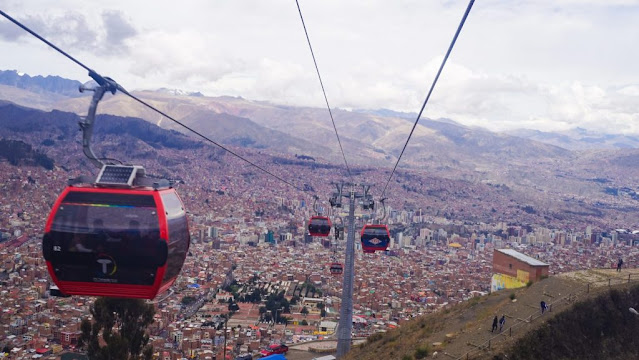Global media coverage of a recent cable car rescue in northern Pakistan has brought to light the widespread use of the improvised aerial transportation systems across mountain communities in the country. The improvised cable car system and the recent zip-line rescue are both testaments to local rural ingenuity. These systems serve as a lifeline for villagers living on sparsely populated hilltops in places like Mansehra, Swat and Azad Kashmir. They allow them to access clinics, jobs, markets and schools on a daily basis. Building the alternative road infrastructure for these mountainous terrains would be much more expensive and time-consuming. A better example of a fast, safe and relatively less expensive public transportation system for such areas can be found in a modern cable car system built in La Paz, Bolivia. Pakistan should explore a public-private partnership to use the local talent to build a safe, fast and cheap cable car system to meet their residents' needs.
 |
| Disabled Pakistan Cable Car Prior to Rescue |
Improvised Cable Cars:
Improvised cable cars are built from scrap and strung up by local communities. It is cheaper and there is no comparable alternative infrastructure. They often use the upper body of a pick-up truck. The system relies on a network of cables which are anchored at various points along the route. These cables support the weight of the cabins and passengers. The main support cables run continuously, while the cabins are pulled by a moving "haul rope".
The cabins are moved and stopped by a combination of mechanical systems. A drive mechanism located at the stations provides the propulsion to move the cabins along the cables. Braking systems are used to slow and stop the cabins.
Zip-line Rescue:
A cable car with 8 passengers, mainly schoolchildren, was left dangling after a support cable broke earlier this month. Pakistan Army helicopters mounted a rescue effort that succeeded in rescuing only one child. The military called off its effort after the air stirred up by the helicopter rotor caused the cable car to shake violently and the daylight dimmed. That's when the local zip-line experts stepped in and successfully rescued the remaining 7 passengers who were trapped hundreds of meters above a valley.
 |
| Cable Car System in La Paz Bolivia |
Bolivian Example:
In 2014, Bolivia inaugurated a cable car system with a length of nearly 7 miles threading through 11 stations, making it the world's largest network of aerial urban transportation. Built by Austria's Doppelmayr Garaventa Group, the La Paz system has become very popular. It serves 18,000 people an hour.
Pakistan's Options:
The governments of Khyber Pakhtunkhwa and Azad Kashmir need to find safe, fast and cost-effective transportation systems for their far-flung hilltop communities. Neither the current road infrastructure nor the improvised cable car systems meet these objectives. Both governments should explore a public-private partnership to use the local talent to build a safe and cheap cable car system to meet their residents' needs. In addition to providing job opportunities for locals, such a system could also become a big attraction for tourists to enjoy seeing the picturesque landscape from the air. It could also be used to promote winter sports in these beautiful areas extending from KPK to Gilgit-Baltistan and Azad Kashmir.
Related Links:
Haq's Musings
South Asia Investor Review
Pakistan Travel and Tourism Boom
Extreme Kayak Adventures in Pakistan
Helicopter Skiing in Karakorams
Climbing K2: The Ultimate Challenge
Indian Visitors Share "Eye-Opening" Stories of Pakistan
American Tourist Picks Pakistan Among Top 10 Best Countries to Visit
Pakistani American to Pakistani Diaspora: Go Back and Visit Pakistan
Riaz Haq's YouTube Channel
PakAlumni Social Network





